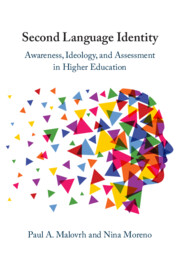Book contents
- Second Language Identity
- Second Language Identity
- Copyright page
- Dedication
- Contents
- Figures
- Tables
- Preface
- Acknowledgments
- 1 On Actors, Architecture, and L2 Advancedness in Higher Education
- Part I Advancedness and the L2 Learner
- Part II Variable Notions of Advancedness
- 5 Language Departments’ Architecture, Ideology, and Mission Regarding L2 Advancedness
- 6 A Quantitative Analysis of Variability in Perceptions of L2 Advancedness among Practitioners, Researchers, and Administrators in Higher Education
- 7 A Qualitative Analysis of Language Professionals’ Descriptions of Their Ideology and Assessment of Advanced L2 Spanish
- Part III Assessment, Identity, and Critical Language Awareness As Markers of Advancedness
- Book part
- Bibliography
- Name Index
- Subject Index
6 - A Quantitative Analysis of Variability in Perceptions of L2 Advancedness among Practitioners, Researchers, and Administrators in Higher Education
from Part II - Variable Notions of Advancedness
Published online by Cambridge University Press: 27 July 2023
- Second Language Identity
- Second Language Identity
- Copyright page
- Dedication
- Contents
- Figures
- Tables
- Preface
- Acknowledgments
- 1 On Actors, Architecture, and L2 Advancedness in Higher Education
- Part I Advancedness and the L2 Learner
- Part II Variable Notions of Advancedness
- 5 Language Departments’ Architecture, Ideology, and Mission Regarding L2 Advancedness
- 6 A Quantitative Analysis of Variability in Perceptions of L2 Advancedness among Practitioners, Researchers, and Administrators in Higher Education
- 7 A Qualitative Analysis of Language Professionals’ Descriptions of Their Ideology and Assessment of Advanced L2 Spanish
- Part III Assessment, Identity, and Critical Language Awareness As Markers of Advancedness
- Book part
- Bibliography
- Name Index
- Subject Index
Summary
This chapter examines the effects of various instructor individual differences (IDs) on their beliefs regarding the “ideal” L2 Spanish and their assessment of speech samples of different advanced oral proficiency sub-levels as determined by the ACTFL-OPI. It also answers the question of whether different language components are rated differently, and if such ratings match the evaluators’ ideologies. Quantitative data were collected from a survey distributed among N=77 members of academic institutions who occupied various professional roles around the world consisting of administrators, researchers, and practitioners. The survey examined constructs such as linguistic structure, sophisticated language use, and sociocultural appropriateness. Results show that instructor IDs affect beliefs regarding advanced language use, that they create bias in assessing it, and that consequently foreign-language departments need to educate its constituents about evolving definitions of advancedness, about the reality of individual biases in assessment, and that they need to provide the leadership to implement them in curricular design.
Keywords
- Type
- Chapter
- Information
- Second Language IdentityAwareness, Ideology, and Assessment in Higher Education, pp. 110 - 137Publisher: Cambridge University PressPrint publication year: 2023

